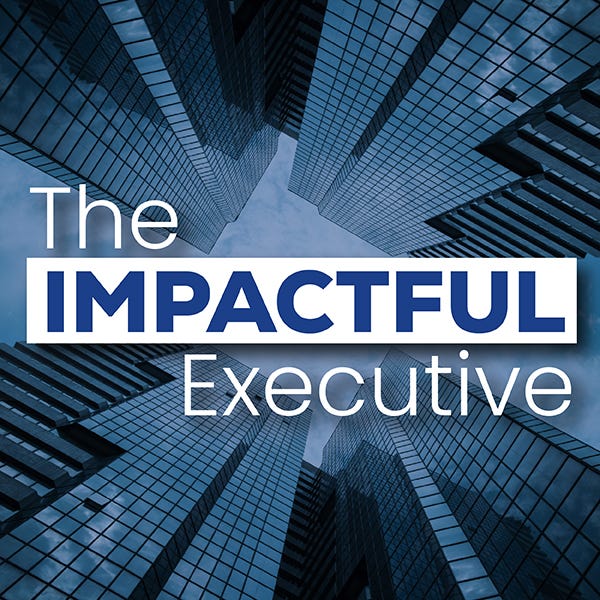Impactful Element: Feedback
Impactful "Feedback": constructive, actionable performance assessment for learning, growth, improvement, and efficiency.
Welcome to The Impactful Executive!
Read time: 2.5 min
The Impactful Executive newsletter uses the Impactful Framework as a loosely structured sequence of nine elements, each with evidence-based practices and tactics for executives, managers, advisors, and their teams.
See the reference article below, if needed, before this Element deep dive.
The Impactful Framework
Evidence-based practices for executive teams.
“Strategy without tactics is the slowest route to victory. Tactics without strategy are the noise before defeat.”
Sun Tzu
Impactful Element Defined: Feedback
"I learned that there is an incredible beauty to mistakes, because embedded in each mistake is a puzzle, and a gem that I could get if I solved it, i.e., a principle that I could use to reduce my mistakes in the future."
Ray Dalio
The “Feedback” element is defined as:
A constructive process of sharing observations, concerns, and suggestions to improve performance and outcomes.
It involves ongoing two-way communication, providing an opportunity for both giving and receiving insights for growth.
Feedback can be both positive - affirming effective behaviors or results, and developmental - highlighting areas for improvement.
A crucial element of feedback is its timeliness, allowing the receiver to adjust behaviors or approaches promptly.
Feedback given in an atmosphere of trust fosters a learning culture, mutual respect, and continuous improvement in a team or organization.
"We cannot change what we are not aware of, and once we are aware, we cannot help but change."
Sheryl Sandberg
"Feedback is the breakfast of champions.”
Ken Blanchard
Impactful Element Practices: Feedback
The following is a sample selection of Impactful Feedback Practices:
Use Constructive Feedback: Specific, actionable feedback lets employees know precisely what they need to improve. At Amazon, new ideas are presented through a six-page narrative structure, followed by a silent reading and detailed questioning session to foster in-depth feedback. At Facebook, managers are trained to provide immediate, in-the-moment feedback, facilitating swift adjustments in work.
Identify Positive Behaviors: recognizing and rewarding desired behaviors promotes their recurrence and motivates employees. Google's peer-to-peer recognition program, "gThanks," allows employees to publicly acknowledge each other's efforts, encouraging repetition of desired behaviors.
Practice Effective Conflict Resolution: Resolving disagreements and conflicts fairly and constructively fosters a positive work environment. Cisco's “Conflict Navigation Model” provides a structured process for addressing and resolving conflicts, improving the work environment and team performance.
Establish Feedback Rhythms: Regularly scheduled one-on-one meetings offer personalized guidance. Shopify conducts these meetings to improve morale and enhance team performance. Asana uses a real-time feedback system called 'Acknowledgments', and Adobe has replaced annual performance reviews with regular "Check-ins," providing continuous performance insights.
Gather Multi-Source or 360-Degree Feedback: Comprehensive feedback approaches involve gathering input from various sources, leading to a more balanced view of performance. GE's "Touchpoints" system involves frequent check-ins, while Google’s "Googlegeist" platform solicits employee feedback about their jobs and the company, improving management practices.
Implement Self-Assessment Practices: Encouraging employees to evaluate their performance fosters self-awareness and personal growth. Google's Perf tool allows employees to assess their performance, identify growth opportunities, and understand their perspectives and concerns through regular engagement surveys.
As Douglas Stone and Sheila Heen wrote in "Thanks for the Feedback", “Feedback is not about 'good' or 'bad,' 'right' or 'wrong.’ It is about effectiveness."
"To handle yourself, use your head; to handle others, use your heart."
Eleanor Roosevelt
"Clear is kind. Unclear is unkind."
Brené Brown
In subsequent newsletters, we will deep-dive into many specific practices outlined above.
The Impactful Executive’s Purpose
Reminder: this newsletter pursues high-impact practices and tactics across each element to share fact-based, usable, and (hopefully) surprising insights.
It takes deliberate and sustained effort to drive organizational greatness. The Impactful Executive aims to make this greatness far more reachable.
In Jim Collins’ words, "Greatness is not a function of circumstance. Greatness, it turns out, is largely a matter of conscious choice and discipline."
Impactfully yours,
The Impactful Executive Team
This post is public. Feel free to subscribe to and share the newsletter below.


